HashMap主要方法源码分析(JDK1.8)

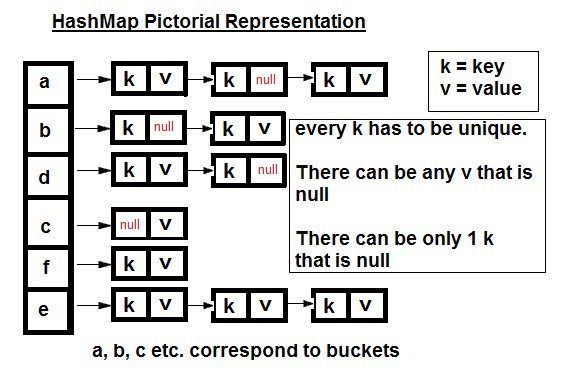
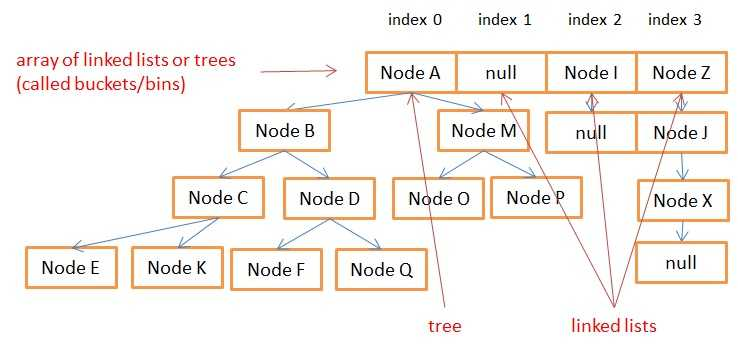
(转化为红黑树时的情况)
一、关于HashMap需要了解的静态常量
二、方法探究
1、put
HashMap中的数组是第一次调用put方法时才创建对象的
下面是从进入put到创建完数组的全过程
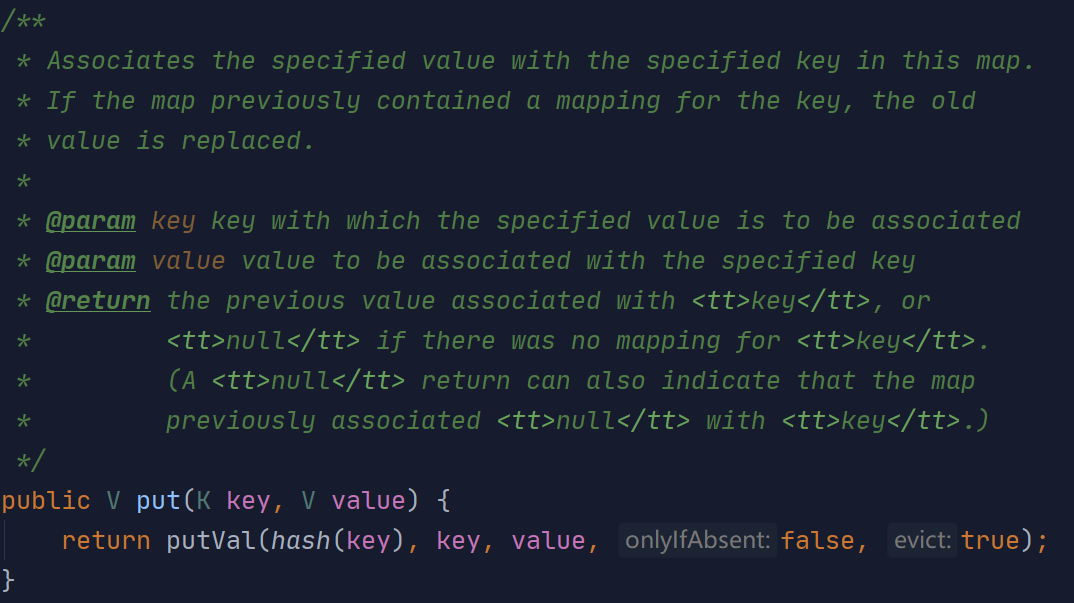
将key、value作为参数传入后,计算key的hash,再传入putVal方法
/**
* Implements Map.put and related methods.
*
* @param hash hash for key
* @param key the key
* @param value the value to put
* @param onlyIfAbsent if true, don't change existing value
* @param evict if false, the table is in creation mode.
* @return previous value, or null if none
*/
final V putVal(int hash, K key, V value, boolean onlyIfAbsent,
boolean evict) {
Node<K,V>[] tab; Node<K,V> p; int n, i;
if ((tab = table) == null || (n = tab.length) == 0)
n = (tab = resize()).length;
if ((p = tab[i = (n - 1) & hash]) == null)
tab[i] = newNode(hash, key, value, null);
else {
Node<K,V> e; K k;
if (p.hash == hash &&
((k = p.key) == key || (key != null && key.equals(k))))
e = p;
else if (p instanceof TreeNode)
e = ((TreeNode<K,V>)p).putTreeVal(this, tab, hash, key, value);
else {
for (int binCount = 0; ; ++binCount) {
if ((e = p.next) == null) {
p.next = newNode(hash, key, value, null);
if (binCount >= TREEIFY_THRESHOLD - 1) // -1 for 1st
treeifyBin(tab, hash);
break;
}
if (e.hash == hash &&
((k = e.key) == key || (key != null && key.equals(k))))
break;
p = e;
}
}
if (e != null) { // existing mapping for key
V oldValue = e.value;
if (!onlyIfAbsent || oldValue == null)
e.value = value;
afterNodeAccess(e);
return oldValue;
}
}
++modCount;
if (++size > threshold)
resize();
afterNodeInsertion(evict);
return null;
}

/**
* Initializes or doubles table size. If null, allocates in
* accord with initial capacity target held in field threshold.
* Otherwise, because we are using power-of-two expansion, the
* elements from each bin must either stay at same index, or move
* with a power of two offset in the new table.
*
* @return the table
*/
final Node<K,V>[] resize() {
Node<K,V>[] oldTab = table;
int oldCap = (oldTab == null) ? 0 : oldTab.length;
int oldThr = threshold;
int newCap, newThr = 0;
if (oldCap > 0) {
if (oldCap >= MAXIMUM_CAPACITY) {
threshold = Integer.MAX_VALUE;
return oldTab;
}
else if ((newCap = oldCap << 1) < MAXIMUM_CAPACITY &&
oldCap >= DEFAULT_INITIAL_CAPACITY)
newThr = oldThr << 1; // double threshold
}
else if (oldThr > 0) // initial capacity was placed in threshold
newCap = oldThr;
else { // zero initial threshold signifies using defaults
newCap = DEFAULT_INITIAL_CAPACITY;
newThr = (int)(DEFAULT_LOAD_FACTOR * DEFAULT_INITIAL_CAPACITY);
}
if (newThr == 0) {
float ft = (float)newCap * loadFactor;
newThr = (newCap < MAXIMUM_CAPACITY && ft < (float)MAXIMUM_CAPACITY ?
(int)ft : Integer.MAX_VALUE);
}
threshold = newThr;
@SuppressWarnings({"rawtypes","unchecked"})
Node<K,V>[] newTab = (Node<K,V>[])new Node[newCap];
table = newTab;
if (oldTab != null) {
for (int j = 0; j < oldCap; ++j) {
Node<K,V> e;
if ((e = oldTab[j]) != null) {
oldTab[j] = null;
if (e.next == null)
newTab[e.hash & (newCap - 1)] = e;
else if (e instanceof TreeNode)
((TreeNode<K,V>)e).split(this, newTab, j, oldCap);
else { // preserve order
Node<K,V> loHead = null, loTail = null;
Node<K,V> hiHead = null, hiTail = null;
Node<K,V> next;
do {
next = e.next;
if ((e.hash & oldCap) == 0) {
if (loTail == null)
loHead = e;
else
loTail.next = e;
loTail = e;
}
else {
if (hiTail == null)
hiHead = e;
else
hiTail.next = e;
hiTail = e;
}
} while ((e = next) != null);
if (loTail != null) {
loTail.next = null;
newTab[j] = loHead;
}
if (hiTail != null) {
hiTail.next = null;
newTab[j + oldCap] = hiHead;
}
}
}
}
}
return newTab;
}
resize

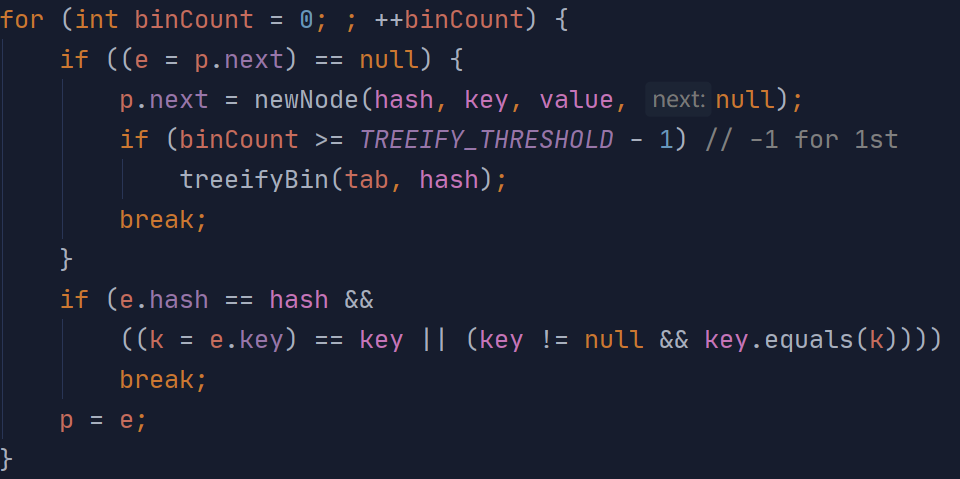
(向下遍历数组当前下标链表的操作)
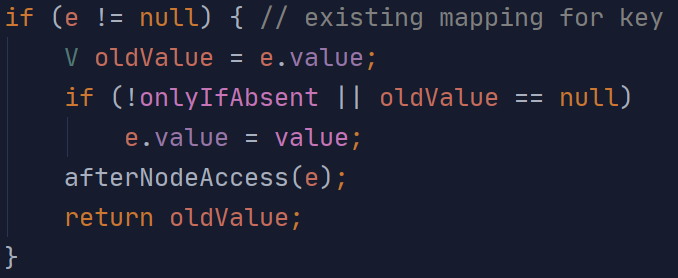
(key相同时value的替换操作)

2、get
* Returns the value to which the specified key is mapped,
* or {@code null} if this map contains no mapping for the key.
*
* <p>More formally, if this map contains a mapping from a key
* {@code k} to a value {@code v} such that {@code (key==null ? k==null :
* key.equals(k))}, then this method returns {@code v}; otherwise
* it returns {@code null}. (There can be at most one such mapping.)
*
* <p>A return value of {@code null} does not <i>necessarily</i>
* indicate that the map contains no mapping for the key; it's also
* possible that the map explicitly maps the key to {@code null}.
* The {@link #containsKey containsKey} operation may be used to
* distinguish these two cases.
*
* @see #put(Object, Object)
*/
public V get(Object key) {
Node<K,V> e;
return (e = getNode(hash(key), key)) == null ? null : e.value;
}
get

(上面的first即为node可能存在的链表的第一个元素)
查找时如果第一个即匹配则直接返回

否则往下遍历直到匹配或node为null
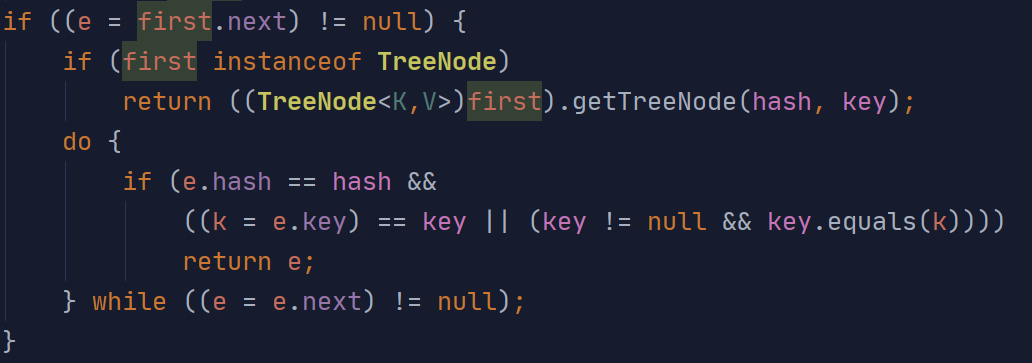
3、removeNode

/**
* Implements Map.remove and related methods.
*
* @param hash hash for key
* @param key the key
* @param value the value to match if matchValue, else ignored
* @param matchValue if true only remove if value is equal
* @param movable if false do not move other nodes while removing
* @return the node, or null if none
*/
final Node<K,V> removeNode(int hash, Object key, Object value,
boolean matchValue, boolean movable) {
Node<K,V>[] tab; Node<K,V> p; int n, index;
if ((tab = table) != null && (n = tab.length) > 0 &&
(p = tab[index = (n - 1) & hash]) != null) {
Node<K,V> node = null, e; K k; V v;
if (p.hash == hash &&
((k = p.key) == key || (key != null && key.equals(k))))
node = p;
else if ((e = p.next) != null) {
if (p instanceof TreeNode)
node = ((TreeNode<K,V>)p).getTreeNode(hash, key);
else {
do {
if (e.hash == hash &&
((k = e.key) == key ||
(key != null && key.equals(k)))) {
node = e;
break;
}
p = e;
} while ((e = e.next) != null);
}
}
if (node != null && (!matchValue || (v = node.value) == value ||
(value != null && value.equals(v)))) {
if (node instanceof TreeNode)
((TreeNode<K,V>)node).removeTreeNode(this, tab, movable);
else if (node == p)
tab[index] = node.next;
else
p.next = node.next;
++modCount;
--size;
afterNodeRemoval(node);
return node;
}
}
return null;
}
removeNode
与getNode的逻辑类似,利用hash值查找可能存在的位置
如果链表第一位就匹配:

对链表的遍历:
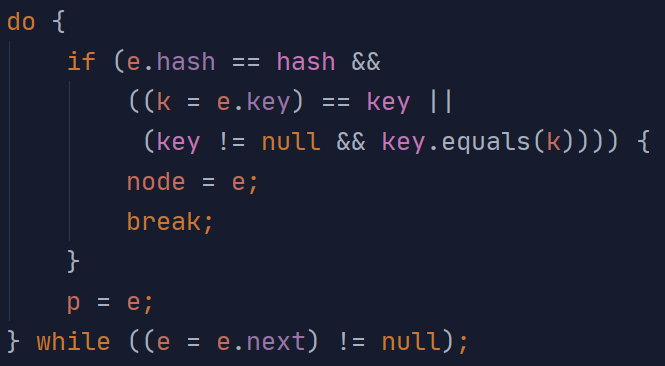
判断node的类型,如果是链表则用node.nest来代替当前位置
最后操作数+1,size-1,返回被remove的node对象
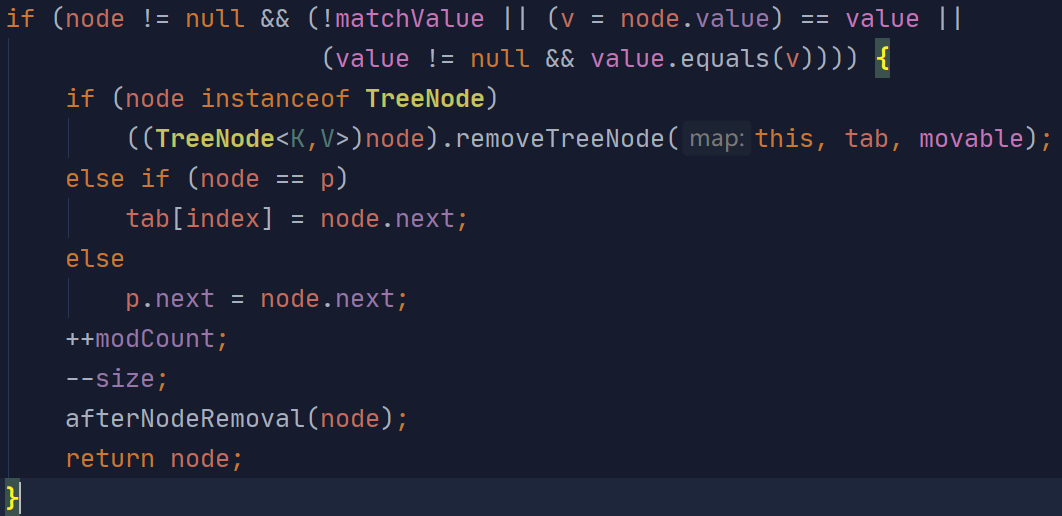
HashMap主要方法源码分析(JDK1.8)的更多相关文章
- 并发-HashMap和HashTable源码分析
HashMap和HashTable源码分析 参考: https://blog.csdn.net/luanlouis/article/details/41576373 http://www.cnblog ...
- ArrayList源码分析--jdk1.8
ArrayList概述 1. ArrayList是可以动态扩容和动态删除冗余容量的索引序列,基于数组实现的集合. 2. ArrayList支持随机访问.克隆.序列化,元素有序且可以重复. 3. ...
- ReentrantLock源码分析--jdk1.8
JDK1.8 ArrayList源码分析--jdk1.8LinkedList源码分析--jdk1.8HashMap源码分析--jdk1.8AQS源码分析--jdk1.8ReentrantLock源码分 ...
- HashMap原理及源码分析
HashMap 原理及源码分析 1. 存储结构 HashMap 内部是由 Node 类型的数组实现的.Node 包含着键值对,内部有四个字段,从 next 字段我们可以看出,Node 是一个链表.即数 ...
- Java split方法源码分析
Java split方法源码分析 public String[] split(CharSequence input [, int limit]) { int index = 0; // 指针 bool ...
- invalidate和requestLayout方法源码分析
invalidate方法源码分析 在之前分析View的绘制流程中,最后都有调用一个叫invalidate的方法,这个方法是啥玩意?我们来看一下View类中invalidate系列方法的源码(ViewG ...
- Linq分组操作之GroupBy,GroupJoin扩展方法源码分析
Linq分组操作之GroupBy,GroupJoin扩展方法源码分析 一. GroupBy 解释: 根据指定的键选择器函数对序列中的元素进行分组,并且从每个组及其键中创建结果值. 查询表达式: var ...
- HashMap源码分析 JDK1.8
本文按以下顺序叙述: HashMap的感性认识. 官方文档中对HashMap介绍的解读. 到源码中看看HashMap这些特性到底是如何实现的. 把源码啃下来有一种很爽的感觉, 相信你读完后也能体会到~ ...
- HashMap实现原理及源码分析(jdk1.8)
HashMap底层由数组+链表+红黑树组成,可接受null值,非线程安全 1.基本属性 transient Node<K,V>[] table; //hashmap数组 static fi ...
随机推荐
- Docker Data
docker data 六.Docker存储 docker存储驱动storage driver(优先使用linux默认的storage driver,因为比较稳定) ubuntu:aufs,/var/ ...
- 原来 CPU 为程序性能优化做了这么多
本文主要来学习内存屏障和 CPU 缓存知识,以便于我们去了解 CPU 对程序性能优化做了哪些努力. 首先来看下 CPU 缓存: CPU 缓存 CPU 缓存是为了提高程序运行的性能,CPU 在很多处理上 ...
- 凸包问题 Graham Scan
2020-01-09 15:14:21 凸包问题是计算几何的核心问题,并且凸包问题的研究已经持续了好多年,这中间涌现出了一大批优秀的算法. 凸包问题的最优解法是Graham Scan算法,该算法可以保 ...
- OpenCV-Python 读取显示图像 | 五
目标 在这里,你将学习如何读取图像,如何显示图像以及如何将其保存回去 你将学习以下功能:cv.imread(),cv.imshow(),cv.imwrite() (可选)你将学习如何使用Matplot ...
- 如何实现浏览器的Console功能
离 JS-Encoder 的最初版本发布已经过了大半年的时间,这段时间除了偶尔修复一下 BUG 外,主要还是忙于学业.最近一段时间不太平,开学时间也大大延迟,加上自己本身对自己的在线编译器不是很满意, ...
- 基于vue-cli-和element-ui的开发admin(1)
//首先以下仅是记录个人本次vue后台管理系统的登录界面部分操作的流程以及踩坑的注意点 一.首先是搭建vue-cli工作环境 这里有两种方式:1.用npm:(在安装了vue,vue-cli以及webp ...
- iPhone连接到Mac上叮叮叮断断续续响个不停的解决办法
一.推荐方式 1.让iPhone和Mac通过数据线连接(对,就是连着) 2.打开终端,执行如下命令: sudo killall -STOP -c usbd 3.一分钟内,iPhone即可连上Mac 二 ...
- [vijos1120]花生采摘<贪心>
题目链接:https://vijos.org/p/1120 这怕是我打过最水的一道题了,但是这道隶属于普及组难度的题我竟然提交4次才过,这不禁让我有些后怕,所以还是含泪写下这篇博客,用来警示一下自己: ...
- P3381 【模板】最小费用最大流(MCMF)
P3381 [模板]最小费用最大流 题目描述 如题,给出一个网络图,以及其源点和汇点,每条边已知其最大流量和单位流量费用,求出其网络最大流和在最大流情况下的最小费用. 输入格式 第一行包含四个正整数N ...
- Asp.Net.Core WebApi 版本控制
前言 在后端Api的开发过程中,无法避免的会遇到接口迭代的过程,如何保证新老接口的共存和接口的向前的兼容呢,这时候就需要对Api进行版本的控制,那如何优雅的控制Api的版本呢? 开始 Microsof ...
